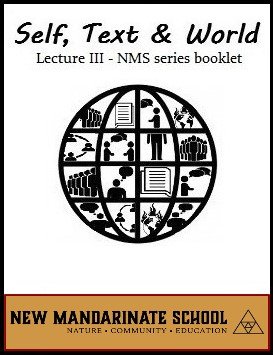Self, Text & World digital booklet
The digital lecture booklet of Self, Text & World contains the essential points from the third lecture in the 10-part NMS lecture series. It is 40 pages in length and also has a handy (and extensive) glossary of terms for ease of reference. The booklet is available in the Store section of the website ($24: www.cmc3industries.com/store) and in hard copy form at the public lectures. It continues many of the themes and issues contained in the foregoing lectures/lecture booklets and specifically explores:
- hermeneutics: history, relationship to the text, interpretation, fusion of horizons, reflexivity, listening, etc.
- the relationship between self and world, self and text, text and world, self and other, etc.
- the personal/subjective side: Jungian individuation/integration, differentiation, adaptive thinking, emotional intelligence, how to assess others and oneself, etc.
- epistemology: what is knowledge? What do I know? What is the value/status of different types of knowledge? How may I assess what kind and whether I have ‘knowledge’? What does it entitle me to say or claim? What does it entitle/suggest/obligate me to do (action) in the world? Detachment/disinterestedness, objectivity, etc.
- alignment: alignment with the text in order to know and internalise it; alignment between text and world and self and world; alignment with your own thoughts/judgements/criticism/decisions
- discourse ethics, communicative rationality, dialogical learning, deliberative democracy, democratological neomandarinisation, etc.
The digital lecture booklet of Self, Text & World contains the essential points from the third lecture in the 10-part NMS lecture series. It is 40 pages in length and also has a handy (and extensive) glossary of terms for ease of reference. The booklet is available in the Store section of the website ($24: www.cmc3industries.com/store) and in hard copy form at the public lectures. It continues many of the themes and issues contained in the foregoing lectures/lecture booklets and specifically explores:
- hermeneutics: history, relationship to the text, interpretation, fusion of horizons, reflexivity, listening, etc.
- the relationship between self and world, self and text, text and world, self and other, etc.
- the personal/subjective side: Jungian individuation/integration, differentiation, adaptive thinking, emotional intelligence, how to assess others and oneself, etc.
- epistemology: what is knowledge? What do I know? What is the value/status of different types of knowledge? How may I assess what kind and whether I have ‘knowledge’? What does it entitle me to say or claim? What does it entitle/suggest/obligate me to do (action) in the world? Detachment/disinterestedness, objectivity, etc.
- alignment: alignment with the text in order to know and internalise it; alignment between text and world and self and world; alignment with your own thoughts/judgements/criticism/decisions
- discourse ethics, communicative rationality, dialogical learning, deliberative democracy, democratological neomandarinisation, etc.
The digital lecture booklet of Self, Text & World contains the essential points from the third lecture in the 10-part NMS lecture series. It is 40 pages in length and also has a handy (and extensive) glossary of terms for ease of reference. The booklet is available in the Store section of the website ($24: www.cmc3industries.com/store) and in hard copy form at the public lectures. It continues many of the themes and issues contained in the foregoing lectures/lecture booklets and specifically explores:
- hermeneutics: history, relationship to the text, interpretation, fusion of horizons, reflexivity, listening, etc.
- the relationship between self and world, self and text, text and world, self and other, etc.
- the personal/subjective side: Jungian individuation/integration, differentiation, adaptive thinking, emotional intelligence, how to assess others and oneself, etc.
- epistemology: what is knowledge? What do I know? What is the value/status of different types of knowledge? How may I assess what kind and whether I have ‘knowledge’? What does it entitle me to say or claim? What does it entitle/suggest/obligate me to do (action) in the world? Detachment/disinterestedness, objectivity, etc.
- alignment: alignment with the text in order to know and internalise it; alignment between text and world and self and world; alignment with your own thoughts/judgements/criticism/decisions
- discourse ethics, communicative rationality, dialogical learning, deliberative democracy, democratological neomandarinisation, etc.
Recommendations:
“With Self, Text & World, Carlisle has managed to perform a difficult feat: to compress the most significant moments in the history of hermeneutics into a single lecture and booklet, and what’s more, relate that history to the problems we face today. The booklet provides an excellent introduction for the layman and a deepening of our understanding of textual interpretation and discourse ethics alike. Essential reading.” - satisfied customer
“Self, Text & World approaches the study and interpretation of texts holistically, encompassing the personal, cultural and structural dimensions of what hermenutics has to teach us about society and ourselves. Particularly valuable from my point of view is the information dealing with empathy, understanding and how to cultivate the ‘fusion of horizons’ from a hermeneutical perspective. Carlisle provides the tools with which to navigate our own day and age, which is characterised by so much misinformation and disinformation online and a decline in the standard of public discourse.” - another satisfied customer


